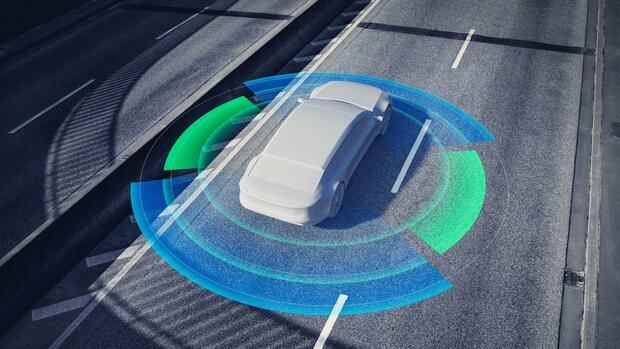The digitization of cars, such as assistance systems or self-driving technology, requires operating software that, similar to computers or smartphones, enables functions and applications to be carried out quickly, efficiently and safely.
(Photo: BOSCH)
Dusseldorf Daimler Truck takes a “strategic minority stake” in Apex AI. This was announced by the German-American start-up, which already has a number of well-known investors: Continental, ZF, Toyota and Airbus.
Behind Apex AI is Jan Becker, who worked at Bosch for a long time and lives in Silicon Valley. His goal: to offer an alternative to systems like Android Auto with the company founded in 2017. “We’re working with many customers on an operating system, and we’ll be able to say more about it this year,” says Becker.
The market and the demand are big, but so is the competition. Volkswagen and other manufacturers and suppliers are working on an “operating system”, as are tech giants such as Google, Nvidia and Qualcomm. “The operating system is one of the key issues in the industry,” says Stefan Bratzel, director of the Center of Automotive Management.
Can Apex AI prevail? The start-up has an advantage on its side: It is user-neutral, so it can communicate with any hardware in vehicles, such as semiconductors from Nvidia or Qualcomm. Therefore, they can be exchanged at will by vehicle manufacturers. “In this way, users avoid dependency, and the application costs fall,” says Becker.
Top jobs of the day
Find the best jobs now and
be notified by email.
This hits a nerve in the industry: Intel, Nvidia and Qualcomm are pushing into the automotive industry with all their might, and the digitization of vehicles requires more and more semiconductors. The chip manufacturers are also increasingly offering software. For example, Mercedes-Benz relies on Nvidia and Volkswagen on Qualcomm when it comes to autonomous driving. The new outfitters demand a lot of money for this, so Mercedes-Benz will have to share every euro of software components with Nvidia in the future.
The neutrality argument also applies to competition from Apex such as Volkswagen. With the Cariad project, they want to develop their own operating system for the industry. “Cariad has big goals, but is making incredibly slow progress,” says car expert Bratzel. “Even the idea of wanting to build an industry standard is difficult. Other manufacturers are reluctant to pay a competitor for licenses.”
Becker knows the intricacies of the automotive industry from his many years at Bosch. Born in Hesse, he did fundamental work on driver assistance systems and autonomous driving, came to Silicon Valley in 2006 to implement a project for robotic vehicles for the renowned Stanford University. He still teaches there today and gives lectures on the subject. “Becker is very smart,” says Peter Fintl, head of research and development at the consulting firm Capgemini. “He knows about the many dependencies in the industry.”
The basis is open source software
For this reason, Apex also made its software compatible with Autosar, a software architecture for electronic control units developed by car manufacturers, suppliers and other companies almost 20 years ago. It is a worldwide success and is used by many suppliers such as Bosch.
To put it simply, Apex offers ready-made software components on the basis of which car operating systems can work, such as reading in data from cameras or other sensors. Becker speaks of a “software library” for dozens of computing cores in a vehicle.
The Apex AI software is based on a foundation that is well known in the professional world: the “Robot Operating System” (ROS), which has been built by programmers, primarily at Stanford University, for 15 years. The source code is open, hence the comparison to Android from Google, which is also based on open source software.
Becker recognized the potential of ROS, but also its weaknesses: insufficient real-time capability, robustness or speed. According to Becker, the Apex developers eliminated the problems. In Germany, Tüv Nord certified the software in the highest safety standard ISO 262262 ASIL D a year ago. “That’s a great achievement,” says technology expert Fintl. “The automotive industry wants functional safety and certification.”
Strong roots in Germany
Becker founded Apex AI together with Dejan Pangercic. The two have known each other for many years from their time in Munich, where the native Slovenian started studying 17 years ago and later did his doctorate in robotics. As the then “Principal Engineer” for autonomous driving at Bosch, Becker brought Pangercic to Silicon Valley in 2012.
Pangercic is now head of technology at the start-up, which has strong roots in Germany. Half of the developers work in Munich or Stuttgart. Overall, Apex employs 90 people, around half more than a year ago.
The start-up raised a total of 74 million dollars, the last round of financing was in the fall. The start-up received the money from venture capitalists such as Canaan, manufacturers such as Volvo and Toyota and suppliers such as Continental and ZF. According to Becker, there is no majority investor, and even taken together, the eleven venture capitalists and companies do not hold an absolute majority of the shares.
Becker does not want to say anything about the market value of the company. A unicorn – i.e. a billion dollar valuation – has not yet been reached, but Apex AI is clearly aiming for the goal. “Our overall rating has grown significantly over the past five years,” says Becker.
More: Start-up Apex AI celebrates breakthrough with car operating system
